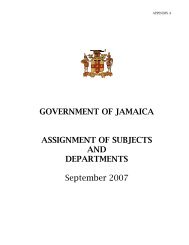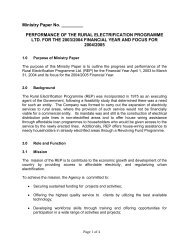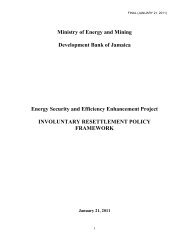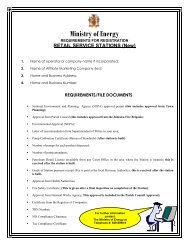Jamaica Biofuels Report - Ministry of Energy
Jamaica Biofuels Report - Ministry of Energy
Jamaica Biofuels Report - Ministry of Energy
Create successful ePaper yourself
Turn your PDF publications into a flip-book with our unique Google optimized e-Paper software.
Pilot Project: Biodiesel RefineryBackgroundAs the National <strong>Bi<strong>of</strong>uels</strong> Policy indicates, development <strong>of</strong> biodiesel in <strong>Jamaica</strong> is in its infancy. ThePetroleum Corporation <strong>of</strong> <strong>Jamaica</strong>’s Center <strong>of</strong> Excellence for Renewable <strong>Energy</strong> is conductingexploratory research to identify promising crops and their potential under local conditions and likelyproductivity on marginal lands. Most <strong>of</strong> the recent effort has focused on jatropha curcas and castor,both <strong>of</strong> which have been the subject <strong>of</strong> small field trials.Given the early stage <strong>of</strong> biodiesel feedstock development, determining the size and location <strong>of</strong> aprocessing facility is difficult, as is predicting the likely cost <strong>of</strong> raw material to the prospective processor.For this reason, the “pilot project” described here is a generic one, designed to illustrate the economicrelationships among feedstock cost, processing plant scale and product selling price. The approach is toestimate what the processor could afford to pay for vegetable oils from jatropha, castor or othersources, since a target price in this form could be useful in designing and evaluating approaches tocultivation and harvesting.Overview <strong>of</strong> optionsOilseed ProductionSection 2.6 <strong>of</strong> the main report discusses sources <strong>of</strong> biodiesel in detail. Based on Brazilian experience, thecost <strong>of</strong> small-scale production <strong>of</strong> castor beans, for example, containing 48% oil, is US $0.50 per Kilo($1.00 per Kilo <strong>of</strong> oil), which amounts to $3.40 per gallon, or roughly twice the cost <strong>of</strong> crude oil.Large-scale mechanized production <strong>of</strong> castor or jatropha could be less costly, but it might also displacesugarcane. As a large-scale field crop, soy might be a better alternative, since it has food as well asenergy value. Another solution would be higher oil-yielding palm trees, which would not compete withcane for land and could possibly provide solid fuel for <strong>of</strong>f-season sugar mill operation.Conversion TechnologyFrom a processing standpoint, as illustrated in Section 6 <strong>of</strong> the main report above, oilseeds will beharvested manually and/or mechanically and sent to a crusher for extraction <strong>of</strong> crude vegetable oil.Recycled oil can also be used, but depending on its free fatty acid (FAA) content, pretreatment may beneeded (Fig. 1). However, such a unit can be ordered as a standard part <strong>of</strong> the integrated modularbiodiesel unit to allow maximal flexibility in dealing with a variety <strong>of</strong> virgin and recycled feedstocks.The oil is subsequently led through a series <strong>of</strong> vessels, where the transesterification process takes placeat 50-60 0 C in the presence <strong>of</strong> excess methanol and potassium hydroxide, which catalyzes the reaction.This standard process leads to the formation <strong>of</strong> primarily a mix <strong>of</strong> methyl esters (biodiesel) and glycerinin a weight ratio <strong>of</strong> approximately 10:1.101










